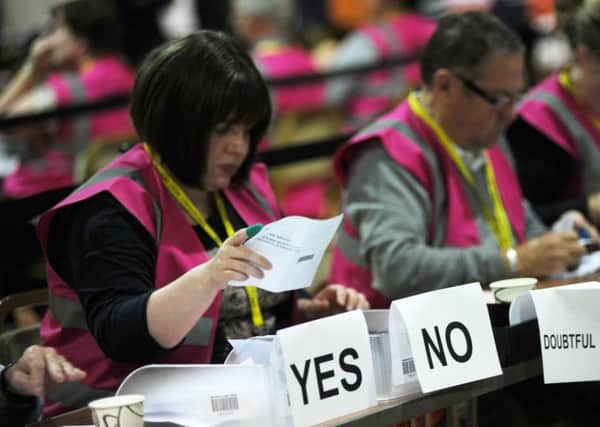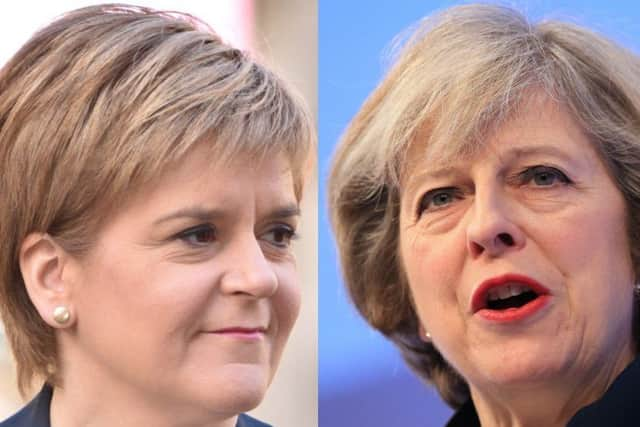Indyref2: Could advocacy groups be a big factor in second vote?


Historians Dan Snow and Tom Holland, as well as prominent anti-independence blogger Kevin Hague are behind the new initiative, which bills itself as promoting the idea that the countries in the United Kingdom are ‘stronger together’.
It’s a reminder that any future campaign to decide whether Scotland leaves the UK will not just be spearheaded by politicians and their chosen representatives.
Advertisement
Hide AdAdvertisement
Hide AdThe outside advocacy groups that were a feature of the first campaign could once again come to the fore if Scotland’s constitutional future is to be decided once again.


If Nicola Sturgeon gets her wish and there is another referendum in 2018 or 2019, then these groups could be as important as the main campaigns.
Some of those groups were so influential in 2014 that versions of them still exist, or have been spun into new or existing political parties, media groups, and campaigning organisations.
But how effective were they? And how much can they help win the battle for hearts and minds as Scotland prepares for another long campaign.
The No side


While not an official campaign organisation in 2014, the These Islands think tank is formed out of the initiative that Mr Snow and Mr Holland took on in that summer of three years ago when they persuaded more than 200 celebrities and public figures to urge Scotland to stay.
A renewed focus on cross-border co-operation could allow this more formal organisation to once again co-ordinate moves from non-Scottish figures that could be vital in the next referendum.
The ‘lovebombing’ aspect of the campaign was crucial, given it was often used in alongside the ‘Project Fear’ approach, when UK politicians warned of some of the dire consequences that Scotland would suffer if we voted to leave the 300-year-old union.
Even as pro-UK politicians, from Kezia Dugdale to Theresa May, decry the call for a referendum and urge Nicola Sturgeon to abandon her plans for another vote, outside bodies are clearly gearing up for the campaign.
Advertisement
Hide AdAdvertisement
Hide AdThe formation of the These Islands think tank, and the re-emergence of Scotland in Union as an active campaigning body shows that the No side aren’t waiting around for the starting gun to be officially fired.
In 2014, with most media organisations, countless companies and celebrities, and the full apparatus of the British state, the No campaign didn’t need to rely quite on the outside or grassroots organisations their Yes counterparts utilised.
The Yes side
By contrast, the Yes campaign relied on all manner of official and unofficial groups to make sure their message was spread as wide as possible.
‘Alternative media’, cultural insurgencies, and ‘Adjective for Yes’ groups sprung up all over the country.
For those who didn’t trust the SNP leaders of the campaign like Alex Salmond, or were deterred by some of his more radical bedfellows like the SSP and the Green Party, these groups could offer a valuable outlet for Yes ideas.
The pro-independence movement has always been a broad church, and with members on the left and right looking to mould an independent Scotland in their own ideological image, advocacy groups were always going to be important.
Some of the most successful outside groups can be expected to return in some form of another, such as the leftist organisation Radical Independence, the founders of which were later involved in the ill-fated political party RISE.
National Collective, whose leader now works in a senior position for the SNP, was a collective of cultural figures whose lofty events were often derided but who succeeded in recruiting prominent activists to the cause.
Drawbacks
Advertisement
Hide AdAdvertisement
Hide AdThese outside groups aren’t always what they are cracked up to be – even though they are useful for the official campaigns to get their message out.
Some of the groups that are completely independent can cause the official campaigns more harm than they are worth if they are too controversial for their own good.
The Orange Order in Scotland, for instance, co-ordinated a pre-referendum ‘show of strength’ in major cities, which Better Together firmly distanced itself from.
From the Yes side, disgruntled activists often complained that too much effort and resource went into setting up countless advocacy groups.
While some, like Scots Asians for Yes, and Farmers for Yes, were more successful, other veterans of the Yes campaign feel that a more streamlined approach would have had a better chance of winning the referendum.
Campaign HQ, led by Blair Jenkins, also made pains to distance themselves from controversial websites that some campaign literature was found to have been directing voters too.
Online-only groups presented a problem after Jim Murphy was hit with an egg during his speaking tour, with the No camp accusing Yes of co-ordinating intimidation through Facebook groups.
So, while the advocacy groups can be helpful, both sides could and should be wary of involving them too closely.
